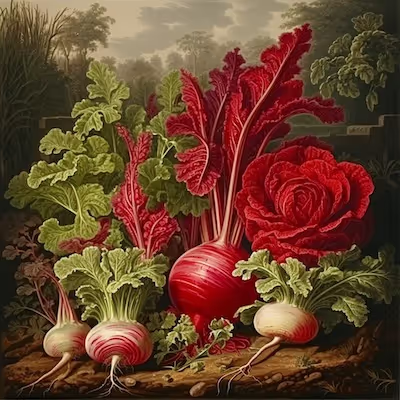Organic Vegetables: Simple Tips for an Affordable Garden

Organic Vegetables
Planting organic vegetables saves cash, enhances flavors, and improves your health. Even city patios can sprout thriving pots of organic vegetables like heirloom tomatoes, leafy greens, and radishes. Learn simple, budget-friendly ways to grow abundant, chemical-free produce right outside your door—no farmer's market required.
Organic Veggie Gardening Cheatsheet: Simple, Budget-Friendly Steps 🌱
🍅 Plan Efficiently
- 📏 Use square-foot gardening: plant densely in raised beds to save space and resources.
- 🗓️ Rotate crops annually to maintain soil fertility and prevent pests.
- 📌 Companion planting: pair basil with tomatoes, carrots with onions to naturally deter pests.
🌱 Start with Strong Seeds
- 🌿 Choose organic, heirloom varieties: ensures higher nutrient content and tastier harvest.
- 🌡️ Germination ideal: maintain 65–75°F (18–24°C) for healthy seedlings.
- 🌞 Provide 6–8 hours direct sunlight daily indoors or outdoors.
🍃 Maximize Healthy Soil Naturally
- ♻️ Compost at home: recycle kitchen scraps into nutrient-rich soil.
- 🪱 Add earthworms: naturally aerate and enrich soil with beneficial microbes.
- 🥚 Use crushed eggshells: boost calcium and prevent blossom-end rot.
🚰 Smart Watering Techniques
- 💧 Water deeply once weekly: apply 1–2 inches (2.5–5 cm) for strong root growth.
- ⏲️ Water early morning: reduces evaporation, fungus and disease risk.
- 🚿 Install drip irrigation: conserves water up to 60% compared to traditional methods.
🐞 Natural Pest Control
- 🌼 Grow marigolds and nasturtiums: attract beneficial insects and repel pests.
- 🌶️ Create DIY spray: blend garlic, hot pepper flakes, water—natural aphid deterrent.
- 🐸 Install small ponds or shelters: frogs control insect population naturally.
🥦 Harvest Tips for Peak Nutrition
- ⏰ Harvest leafy greens frequently: boosts continuous growth and nutrition.
- 🍆 Pick veggies morning or late afternoon: ensures peak freshness, flavor, vitamin content.
- 🗓️ Store properly: cure potatoes, onions in dry, cool spots; preserve nutrients longer.
📊 Quick Facts for Inspiration
- 🥗 Homegrown organic veggies contain up to 40% higher antioxidants compared to conventional produce.
- 💰 Growing veggies at home can reduce grocery spending by up to $500 (€470) annually.
- 🍃 Home composting reduces landfill waste by nearly 30% per household each year.
Why I Choose Organic Vegetables Every Season
Growing my own organic vegetables started out as a stubborn desire to enjoy tomatoes that tasted like summer again. Store-bought produce often felt like a watered-down shadow of the real thing.
My first harvest featured oddly-shaped carrots and spinach leaves with personality—but the flavors, my goodness, they blew store produce out of the water.
Keep Things Simple: Soil and Composting Basics
Good soil forms the backbone of gardening success. I've learned the hard way: healthy soil equals thriving crops.
Start by mixing compost into your existing garden soil. Compost turns kitchen scraps into nutrient-rich gold that's free and abundant.
- Collect veggie peels, coffee grounds, eggshells—even cardboard.
- Layer these in a compost bin or pile.
- Let nature work its magic over several weeks, turning periodically.
Remember, composting isn't rocket science—nature does most of the work. I swear by my compost heap; it feeds my garden every year, saving me money and trips to the store.
Choosing the Right Organic Vegetables to Grow
Begin with vegetables you crave most—this motivation keeps your garden thriving. Tomatoes, zucchini, leafy greens (like kale or chard), radishes, and herbs like basil or cilantro are beginner-friendly champions.
Last year, I ventured into heirloom tomatoes and rainbow carrots. Vibrant colors, spectacular flavors, and guests always asked, "Wow, where did you find these?"
Seeds vs. Starter Plants: Which Way to Go?
Starting organic vegetables from seeds saves money and connects you intimately with the plant’s full lifecycle. I love nurturing tiny sprouts indoors on sunny windowsills—little triumphs every morning.
However, certain veggies—like peppers and eggplants—benefit from buying starter plants. They're picky about germination and can be stubborn seedlings.
"A garden requires patient labor and attention. Plants do not grow merely to satisfy ambitions or to fulfill good intentions." — Liberty Hyde Bailey
Organic Pest Control Without Breaking the Bank
Pests used to drive me crazy, but organic gardening taught me balance and patience. Instead of chemical warfare, I now use companion planting.
For example, planting basil and marigolds near tomatoes deters harmful insects naturally. Ladybugs released into the garden cleanly dispatch common pests, and birds become welcome allies when provided with fresh water.
Water Wisely for Healthy Organic Veggies
Deep, infrequent watering strengthens roots, preparing plants for hot summer days. Early morning watering is ideal, reducing evaporation and disease risks.
I installed a simple drip irrigation system—it's inexpensive, easy to set up, and reduces water waste dramatically.
Harvesting Your Bounty: Reaping the Delicious Rewards
Picking your organic vegetables at their peak ripeness delivers the highest nutritional content and unbeatable taste. The satisfaction of plucking a ripe tomato, warm from the sun, rivals the best culinary experiences.
Nothing beats fresh, homegrown veggies in flavor or price. With some imagination and a little sweat, your garden becomes your personal, affordable, and abundant organic supermarket.
Frequently Asked Questions About Growing Organic Vegetables
How should I choose the best seeds for organic gardening?
Select certified organic seeds from reputable suppliers to ensure they are free from synthetic treatments and genetically modified organisms (GMOs). Opt for heirloom seed varieties for stronger crops, dependable harvests, and better adaptability to your local climate.
What type of soil is ideal for organic vegetable gardens?
Organic vegetables thrive in soil rich with nutrients and beneficial microorganisms. Incorporate ample amounts of compost, aged manure, and organic matter into your soil, cultivating a loose, fertile environment that retains moisture and drains efficiently.
Which natural fertilizers enhance organic vegetable growth effectively?
Compost tea, bone meal, fish emulsion, and worm castings serve as excellent natural fertilizers, providing vital nutrients like nitrogen, phosphorus, and potassium to organic vegetable plants. Regular application supports vigorous growth and abundant yields.
How often should organic vegetables be watered?
Water organic vegetables consistently and deeply, typically providing 1 to 2 inches (2.5 to 5 cm) of moisture per week. Adjust watering schedules according to weather conditions and soil moisture to prevent stress and encourage robust root growth.
Which strategies help control pests organically in vegetable gardens?
Combine methods such as crop rotation, companion planting, beneficial insects like ladybugs and praying mantises, and natural repellents like neem oil. These steps limit pest populations naturally, enhancing plant health without harmful chemicals.
How do I keep weeds under control without chemicals?
Prevent weed growth effectively by applying organic mulch, such as straw, grass clippings, or shredded leaves, around vegetable plants. Additionally, regular hand-weeding and maintaining appropriate plant spacing reduce weed populations organically.
What vegetables are easiest to grow organically for beginners?
Beginners find greater success with resilient vegetables such as lettuce, radishes, carrots, zucchini, beans, spinach, and tomatoes. These plants grow quickly, require minimal maintenance, and adapt easily to various garden environments.
Is crop rotation necessary for organic vegetable gardening?
Yes. Practicing crop rotation every season effectively prevents disease buildup and pest infestations. Implement a three- or four-year cycle by grouping vegetables according to nutrient needs, ensuring ongoing soil fertility and enhanced vegetable productivity.
Growing organic vegetables at home is simple, affordable, and deeply satisfying. There's joy in grabbing a ripe tomato, warm off the vine, or biting into crisp, fresh greens you've cultivated yourself. Start small and focus on what you love. Compost leftovers, choose quality seeds, and let nature guide you. Organic vegetables aren't about perfection, they're about flavor, health, and connection to your food and the earth. Plant smart, nurture wisely, and taste the difference in every bite.
Find out which plants will thrive in your garden!
Answer a few fun questions and get custom plant recommendations perfect for your space. Let’s grow something amazing together!

start your season





